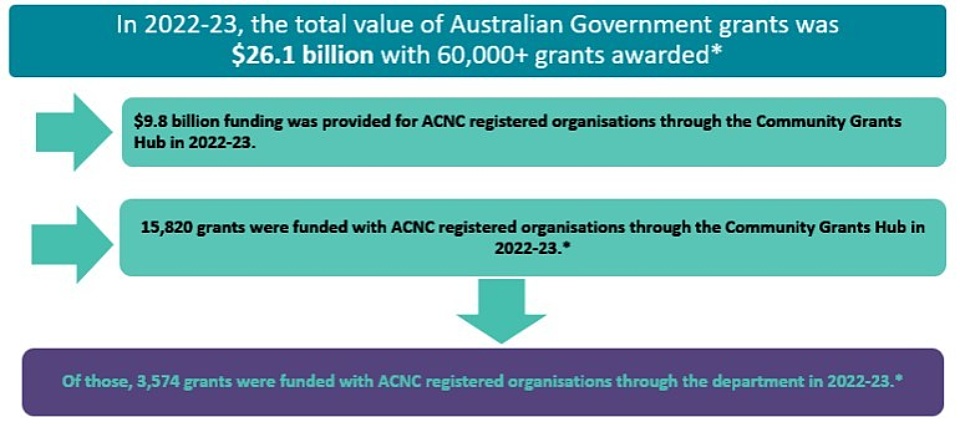
More are seeing clearly on gender, but action lags
Posted on 20 May 2025
Australia's philanthropic sector is making big strides in recognising the importance of gender…
Posted on 19 Sep 2023
By Greg Thom, journalist, Institute of Community Directors Australia

The Albanese government has acted on its election promise to create a “stronger more diverse and independent community sector” by calling for submissions to reform government grant funding.
Organisations and individuals have until Tuesday, November 7 to submit feedback on innovative approaches to how government grants are awarded and managed.
The Department of Social Services (DSS) has released a 39-page issues paper in support of the submissions process.
The government said the issues paper aimed to reflect what the department had already heard from community sector organisations about current challenges facing the sector and what Canberra could do to help.
The department is seeking feedback on a range of questions in five key focus areas covered in the issues paper:

Some of the options on the table for consideration include more collaboration and co-design between government and community organisations, cutting red tape, reducing administration costs and duplication of services and support for pilot projects to encourage communities to explore new strategies.
More than 60,000 federal government grants totalling $26.1 billion were were awarded to organisations across the nation in 2022-2023 providing support to millions of disadvantaged Australians.
DSS said it wanted to hear from an array of voices, including academics, advocacy organisations, providers of community services, those who use those services and people unable to gain access.
The department said responses to the issues paper would help it inform the government of what changes could be made, particularly to grants policy, practices and processes and how they might be implemented.
The issues paper acknowledged the frustration expressed by community organisations around the limitations of current grants funding and processes in allowing them to meet growing and changing community needs.
A 2022 survey conducted by the Australian Council of Social Services (ACOSS) found just 9% of community sector leaders agreed that funding covered the full cost of service delivery, down from 20% the previous year.
“The real challenge is achieving sustainable change in the way governments treat charities and NFPs."
In a joint statement signed by several MPs including now Charities Minister Andrew Leigh released on the eve of last year’s federal election, Labor made a string of commitments, including restoring the freedom of community sector organisations to advocate freely.
The ALP also promised that grants would reflect the real cost of delivering quality services; pledged to end the practice of competing on wages; and promised that grant funding would flow to a greater diversity of not-for-profits, particularly trusted community organisations with strong local links.
The issues paper acknowledged that covid, natural disasters and the rising cost of living, had all had a significant impact on the sectors ability to support Australians in need and enhance the wellbeing of the broader community.
In the October budget, Canberra announced an extra $560 million over four years from 2022-2023 designed to support community sector organisations.

Community Council for Australia CEO David Crosbie welcomed the latest development to strengthen the community sector.
“It is a positive step forward that the Department of Social Services is reviewing the way it contracts and engages with charities and the broader not-for-profit sector,” he said.
Mr Crosbie said it was also good that the Community Sector Advisory Group, comprising 27 NFPs contracted by the department, had had significant input into the discussion paper and the consultation to date.
He said ideally, though, such a review should draw on the outcome of previous reviews rather than “reinvent the wheel.
“The key issue for the sector is not so much knowing where the problems are, or getting sets of words we can all agree to around the desired relationship between government departments and NFPs,” said Mr Crosbie.
“The real challenge is achieving sustainable change in the way governments treat charities and NFPs.
“We can only hope this latest review will move us closer to action and not just repeat past failures to follow through on much needed reforms.”
Written submissions must be lodged by 5pm AEDT on 7 November 2023 AEDT.
A stronger, more diverse and independent community sector

Posted on 20 May 2025
Australia's philanthropic sector is making big strides in recognising the importance of gender…

Posted on 05 May 2025
SmartyGrants has released a new embedded reporting tool designed to strengthen grantmakers’ ability…

Posted on 01 May 2025
A rating system developed by UK foundations offers valuable insights into how grantmakers around…

Posted on 01 May 2025
With the sector juggling restricted grants, tight timelines, high-stakes acquittals, and a…

Posted on 13 Mar 2025
In a February 2025 piece, Maria Chertok and Chandrika Sahai say there's a growing awareness within…

Posted on 10 Mar 2025
Signing on a £1 million (AU$1.93 million) grants program celebrating maritime histories around the…

Posted on 10 Mar 2025
Adam Ognall, executive director of partnerships and practice at Philanthropy Australia, considers…

Posted on 24 Sep 2024
Former professional grantwriter Kylie Cirak believes that grantmakers should look more favourably…

Posted on 16 Sep 2024
Solving the world's biggest problems requires failure, pain, calculated risks and big investments,…

Posted on 19 Jul 2024
A British small grants scheme is among a handful of grantmakers globally experimenting with…

Posted on 06 Mar 2024
SmartyGrants’ leaders were blown away by the enthusiasm and expertise of New Zealand’s best…

Posted on 06 Mar 2024
Philanthropic funding for environmental and climate change causes is increasingly rapidly, but not…